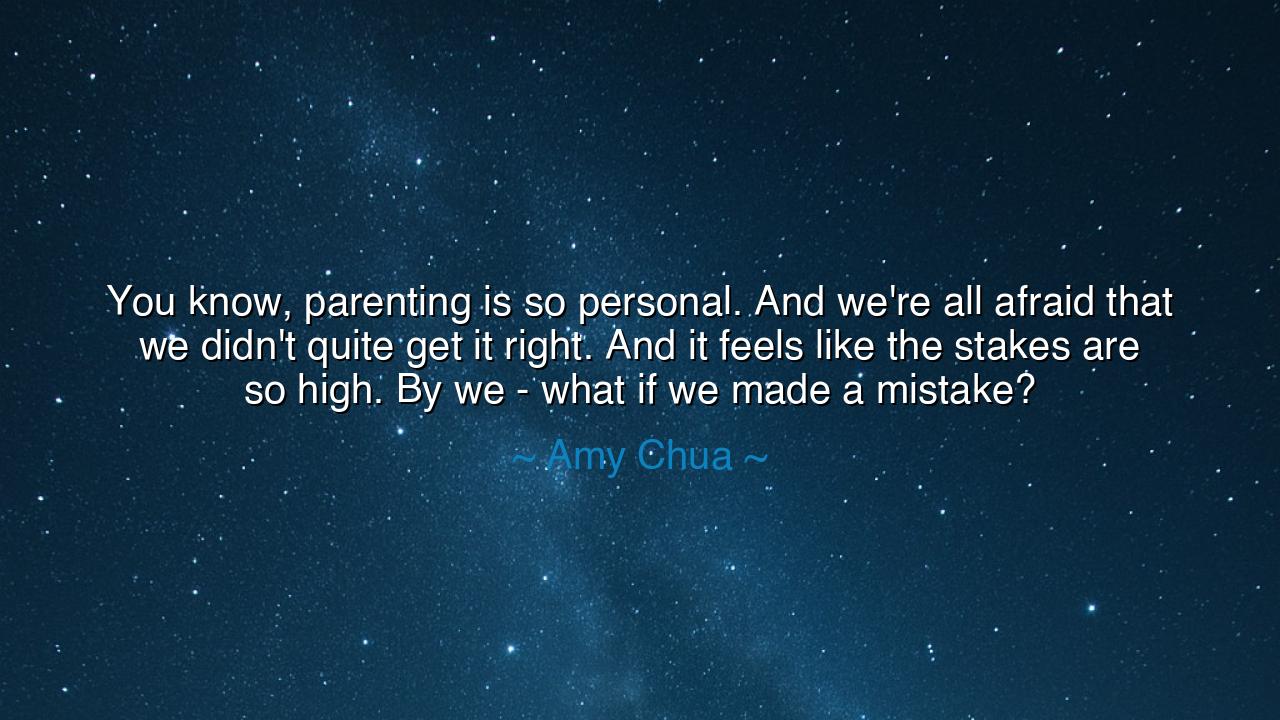
You know, parenting is so personal. And we're all afraid that we
You know, parenting is so personal. And we're all afraid that we didn't quite get it right. And it feels like the stakes are so high. By we - what if we made a mistake?






In the words of Amy Chua, a voice both fierce and vulnerable, we hear this confession: “You know, parenting is so personal. And we’re all afraid that we didn’t quite get it right. And it feels like the stakes are so high. By we—what if we made a mistake?” These words echo the cry of every parent across ages, for they reveal the trembling truth: to raise a child is to walk on sacred ground, where every step may shape a destiny. The task is filled with awe, but also with fear, for the heart knows that its choices leave marks upon another soul.
The ancients often spoke of this burden. In the myth of Pygmalion, the sculptor feared the imperfection of his own creation, praying that the gods might breathe life into his work. So too do parents, who shape children not from stone, but from love and discipline, fear the flaws of their shaping hands. Chua names this timeless dread: that though our intentions burn with love, our actions may falter, leaving scars where we hoped for strength. Truly, parenting is a mirror of the human condition itself—noble in aspiration, fragile in execution.
History too bears testimony. Consider the emperor Marcus Aurelius, revered as a philosopher-king, whose writings taught humility, virtue, and wisdom. Yet his son, Commodus, grew to be one of Rome’s most despised rulers, remembered for cruelty and excess. Did Marcus not feel the anguish of Chua’s words—that perhaps he had failed, that his guidance was not enough? Here lies the paradox: even the wisest cannot guarantee the path of their children. The fear of mistake shadows every parent, from emperors to peasants alike.
Chua’s words also remind us that parenting is personal, for no two parents bear the same struggles, and no two children receive guidance in the same way. Advice may be shared, examples may be studied, but in the end, each parent must wrestle in the quiet hours of their own home. The decisions are intimate: when to discipline, when to embrace, when to let go. And in each decision, the parent fears—what if I chose wrongly? What if my words wounded instead of healed? What if I planted doubt instead of courage? Such fears, though heavy, are the measure of love.
Yet there is wisdom hidden within this fear. The very awareness of high stakes can guide parents toward humility, patience, and presence. A parent who trembles at the possibility of error is one who cares deeply. To feel the weight of responsibility is not weakness, but proof of devotion. For the careless parent feels no fear; only the loving heart feels the trembling of consequence. Thus, the fear Chua names is not a curse, but a signpost that the parent has entered the sacred work with reverence.
The lesson, then, is twofold. First, let us accept that mistakes are inevitable, but not final. Children, too, are resilient, and love can heal what discipline may bruise, just as patience can mend what haste has broken. Second, let us embrace forgiveness—both of ourselves and of our children. To err is human, but to grow together through error is divine. The goal is not perfection, but persistence, not flawlessness, but faithfulness.
O seekers of truth, remember this: the fear of failing in parenting is itself proof of love. It is the trembling of the heart that knows it is shaping eternity through the soul of a child. Do not be paralyzed by this fear, but let it sharpen your wisdom and deepen your compassion. For children do not need perfect parents; they need present ones. And mistakes, when acknowledged with humility, can become lessons more powerful than perfection ever could.
Thus, Amy Chua’s words, though born of vulnerability, carry the weight of timeless teaching. Parenting is indeed personal, the stakes high, and mistakes inevitable. But in the end, what matters most is not the absence of error, but the presence of enduring love. Let this be the lesson handed down: embrace the task with reverence, forgive yourself with grace, and let every mistake be transformed into a stepping stone toward wisdom—for both parent and child.






AAdministratorAdministrator
Welcome, honored guests. Please leave a comment, we will respond soon